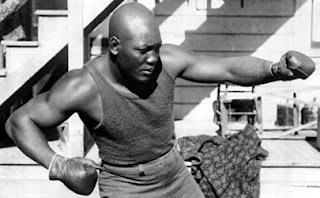Jack the lad
 He did what he said he would do and went where he said he
would go, he said whatever he wanted to say, he was a true maverick in every
sense of the word. At the turn of the 20th
century the thought of a black man living the high life; driving around in
fancy cars, flashing the cash about, drinking champagne and cavorting with
numerous amounts of Caucasian women was absolutely absurd and the mere
suggestion of such behaviour went along with serious consequences.
He did what he said he would do and went where he said he
would go, he said whatever he wanted to say, he was a true maverick in every
sense of the word. At the turn of the 20th
century the thought of a black man living the high life; driving around in
fancy cars, flashing the cash about, drinking champagne and cavorting with
numerous amounts of Caucasian women was absolutely absurd and the mere
suggestion of such behaviour went along with serious consequences.
Jack Johnson managed
to achieve all of that was previously mentioned with aplomb and he did it unapologetically
at that. For those unfamiliar with the name Jack Johnson, he was the first
black heavyweight boxing champion, crowned in 1908 after a fearsome struggle to
be granted the ‘privilege’ to a black contender of a title fight against Tommy
Burns whom Jack served an uneven whipping to amidst relentless jeering and
racial abuse being hurled from both his opponents corner and a baying
crowd.
 Jack didn’t just defeat Tommy Burns he did it in style;
toying with his opponent whilst provoking him by asking him if his mother had taught
him to punch, pointing at points of his own body where Tommy Burns should try
and hit, picking him up if he began to stumble under a barrage of swift
combinations before serving him some more licks and all the time smiling back
at any racial slur that was aimed his way.
Jack didn’t just defeat Tommy Burns he did it in style;
toying with his opponent whilst provoking him by asking him if his mother had taught
him to punch, pointing at points of his own body where Tommy Burns should try
and hit, picking him up if he began to stumble under a barrage of swift
combinations before serving him some more licks and all the time smiling back
at any racial slur that was aimed his way.
Jack was a flamboyant showman and I have mentioned his
penchant for fancy cars and beautiful fair skinned women, Jack was also
accustomed to fine tailored suits that where often accompanied by ostentatious
matching hats, which he would elegantly don on his many nights out on the
town. Born to a parentage of former
slaves Jack was one amongst first generation of free African Americans and Jack
like many of his peers faced the daily struggles that were attached to having a
particular skin colour in those times.
 Jim Crow laws were rife and down in the southern states it
could be considered a fatal mistake for a black person to ‘step out of line.’
For some reason, either brazenly or ignorantly - Jack didn't seem to know ‘his
place.’ He would speed around the old dirt roads of Alabama and Mississippi
without a care in the world, even some black folk thought of him as a bullish troublemaker
who was doing more damage for his race then good. His prize fighting winnings afforded him a
lavish lifestyle and further funded his outlandish exploits.
Jim Crow laws were rife and down in the southern states it
could be considered a fatal mistake for a black person to ‘step out of line.’
For some reason, either brazenly or ignorantly - Jack didn't seem to know ‘his
place.’ He would speed around the old dirt roads of Alabama and Mississippi
without a care in the world, even some black folk thought of him as a bullish troublemaker
who was doing more damage for his race then good. His prize fighting winnings afforded him a
lavish lifestyle and further funded his outlandish exploits.
In one instance, Jack was tearing through one of the southern
states in a fancy sports car of the day and was stopped by a local officer who
confronted him with something along the lines of “ I don't know where you think
you going in such a hurry ‘boy’ that’s gonna cost ya.” To which Jack replied:
“how much?” “$50” the officer said (an extortionate amount in those days). Jack
calmly pulled out a roll of notes and handed the policeman $100. The stunned
officer responded with “I can’t change that.” To which Jack responded: “Keep the
change I’m coming back the same way.”
 After five years of rejection from current heavyweight
champions who simply refused to fight a black man for the title although they
had fought plenty of black fighters along their own ascents Jack was finally
allowed a shot at the title following a rich Australian businessman paying to stage
the fight. King Edward the 7th was one of many keen boxing fans that believed
that Jack was the only natural contender for the prestigious prize and called
out the fighters who wouldn't allow him the right to a challenge.
After five years of rejection from current heavyweight
champions who simply refused to fight a black man for the title although they
had fought plenty of black fighters along their own ascents Jack was finally
allowed a shot at the title following a rich Australian businessman paying to stage
the fight. King Edward the 7th was one of many keen boxing fans that believed
that Jack was the only natural contender for the prestigious prize and called
out the fighters who wouldn't allow him the right to a challenge.
When Jack was finally allowed into the ring for a title
fight he effortlessly proved to the world who the rightful champion was - much
to the dismay of many of the patriots in a highly racially segregated nation. As
champion - Jack was now gaudier than ever; revelling copiously in his success
and bringing plenty of ‘sporting women’ along for the ride.
 Many attempts were made to knock Jack off his lofty perch
and when it could not be achieved in the ring the powers in place used the law
to pin some trumped up charges against the champ. Jack was charged with
violating a recently introduced law known as the Mann act which prohibited the transportation
of women across state lines for the purpose of prostitution. They first accused
Jack of this violation in connection with his most recent floozy, a Miss Lucille
Cameron who when probed on the witness stand with questions of “Where you
forced to go with Jack? What did he do to you?”
She proclaimed that she was in love with Jack and wished to marry him
which was not the response that they were hoping for.
Many attempts were made to knock Jack off his lofty perch
and when it could not be achieved in the ring the powers in place used the law
to pin some trumped up charges against the champ. Jack was charged with
violating a recently introduced law known as the Mann act which prohibited the transportation
of women across state lines for the purpose of prostitution. They first accused
Jack of this violation in connection with his most recent floozy, a Miss Lucille
Cameron who when probed on the witness stand with questions of “Where you
forced to go with Jack? What did he do to you?”
She proclaimed that she was in love with Jack and wished to marry him
which was not the response that they were hoping for.
Jack was eventually convicted when the investigating
officers came across Belle Schreiber an
ex-lover of his who when threatened with jail herself completely cooperated with the investigation
and Jack was immediately found guilty by an all-white jury, in the south,
basically he didn't stand a chance even though the law was aimed at the
transportation of numerous women and not the travelling of a mixed race couple
and the fact that the time Jack had spent with Bell was before the Mann act was
introduced. Jack being Jack was unapologetic claiming that he was not a
slave and that as long as he has eyes and a heart that worked he would be choosing
who his mates would be without the dictation of any man.
 Feeling an injustice had been served Jack decided to skip
bail and went into exile for number of years before descending into disparity
and handing himself in to the authorities but not before accepting a title
fight with a giant of a man named Jess Willard who an ageing and un-trained Jack
finally conceded to in the 26th round after out punching Willard for
20 rounds before finally running out of steam.
A defeated Jack lay on his back with his arms folded over his eyes –
this act did everything to suggest that he had not in fact been knocked out but
that he had simply had enough of fighting, both physically and mentally and
more than anything else against the many powers set in place to bring him down.
Feeling an injustice had been served Jack decided to skip
bail and went into exile for number of years before descending into disparity
and handing himself in to the authorities but not before accepting a title
fight with a giant of a man named Jess Willard who an ageing and un-trained Jack
finally conceded to in the 26th round after out punching Willard for
20 rounds before finally running out of steam.
A defeated Jack lay on his back with his arms folded over his eyes –
this act did everything to suggest that he had not in fact been knocked out but
that he had simply had enough of fighting, both physically and mentally and
more than anything else against the many powers set in place to bring him down.
Jack certainly was a true maverick of his age;
he fought against prejudice and social injustice in such a fearsome manner that
impacted worldwide even harder than his mean right hook so impeccably did. To
many he was a hero, yet, he was probably a villain to many more as his
unapologetic approach to life certainly did him no favours in the eyes of his
critics, but what did jack have to apologise for? He fought his way to the top
and he enjoyed the fruits of his labour, all the while smiling in the faces of
those who opposed, an existence that would have only of been revelled and
marvelled by all if not for one thing, his skin colour. The fact that a life
story so absorbing and compelling is hardly publicised still raises a few
questions in my mind. Jack Johnson
certainly had nothing to apologise for, if anything it is the preposterous
social climate of the era that he lived in that should have apologised to him.
“In looking back over
the years of my tumultuous career I am astounded when I realise that there are
few men in the world’s history that have led a more varied or more intense
experience than I.”
Jack Johnson
David, TCC



Comments
Post a Comment